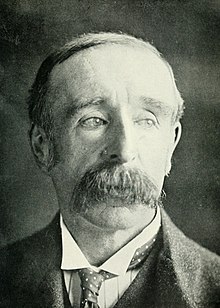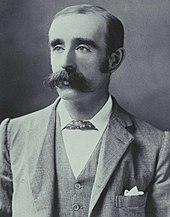Paddy Glynn
This article needs additional citations for verification. (April 2017) |
Paddy Glynn | |
|---|---|
 | |
| Minister for Home and Territories | |
| In office 17 February 1917 – 3 February 1920 | |
| Prime Minister | Billy Hughes |
| Preceded by | Fred Bamford |
| Succeeded by | Alexander Poynton |
| Minister for External Affairs | |
| In office 24 June 1913 – 17 September 1914 | |
| Prime Minister | Joseph Cook |
| Preceded by | Josiah Thomas |
| Succeeded by | John Arthur |
| Attorney-General of Australia | |
| In office 2 June 1909 – 29 April 1910 | |
| Prime Minister | Alfred Deakin |
| Preceded by | Billy Hughes |
| Succeeded by | Billy Hughes |
| Member of the Australian Parliament for Angas | |
| In office 16 December 1903 – 13 December 1919 | |
| Preceded by | New seat |
| Succeeded by | Moses Gabb |
| Member of the Australian Parliament for South Australia | |
| In office 30 March 1901 – 16 December 1903 | |
| Preceded by | New seat |
| Succeeded by | Divided into single-member divisions |
| Member of the South Australian Parliament for North Adelaide | |
| In office 22 May 1897 – 1901 Serving with Richard Wood | |
| Preceded by | Arthur Harrold |
| Succeeded by | Hugh Denison |
| Member of the South Australian Parliament for North Adelaide | |
| In office 8 June 1895 – 25 April 1896 Serving with Richard Wood | |
| Preceded by | George Charles Hawker |
| Succeeded by | Arthur Harrold |
| Member of the South Australian Parliament for Light | |
| In office 21 April 1887 – 22 April 1890 Serving with Jenkin Coles | |
| Preceded by | David Moody |
| Succeeded by | James Wharton White |
| Personal details | |
| Born | 25 August 1855 Gort, County Galway, Ireland |
| Died | 28 October 1931 (aged 76) North Adelaide, South Australia |
| Nationality | •Irish •Australian |
| Political party | Free Trade (1901–06) Anti-Socialist (1906–09) Liberal (1909–17) Nationalist (1917–19) |
| Spouse(s) | Abigail Dynon
(m. 1897; died 1930) |
| Children | 6 |
| Alma mater | Trinity College, Dublin |
| Occupation | Barrister |
Patrick McMahon Glynn KC (25 August 1855 – 28 October 1931) was an Irish-Australian lawyer and politician. He served in the House of Representatives from 1901 to 1919, and was a government minister under three prime ministers, as Attorney-General (1909–1910), Minister for External Affairs (1913–1914) and Minister for Home and Territories (1917–1920). Prior to entering federal politics, Glynn was involved in the drafting of the Constitution of Australia. Born in Ireland, he arrived in Australia in 1880 and served three terms in the South Australian House of Assembly, as well as a brief stint as Attorney-General of South Australia.
Early life[]
Glynn was born in Gort, County Galway, Ireland and educated at the French College, Blackrock and Trinity College, Dublin. Glynn graduated with a BA and LLB, and was the medallist for Oratory at the Law Students Debating Society of Ireland in 1880. The same year saw Glynn immigrate to Australia.
Glynn was admitted to the Victorian bar. His time in Victoria was not a success and in 1882 he moved to Kapunda, South Australia to open a branch of an Adelaide-based law firm. His success in Kapunda allowed him to open his own law firm in Adelaide and involve himself in the political sphere. He also edited for some time the Kapunda Herald.
South Australian politics[]
Glynn served as president of the South Australian branch of the Irish National League and helped found the South Australian Land Nationalisation Society. His community profile assisted him in his election to the South Australian House of Assembly as the member for Light in 1887. As an advocate of free trade, Glynn was considered a conservative but his support of progressive issues like female suffrage and land nationalisation isolated him from his conservative colleagues.
Glynn was defeated at the 1890 election and stood unsuccessfully for Light again at the 1893 election but returned to South Australian colonial politics in 1895 as the member for North Adelaide. With this victory, he became the first person in Australia to be elected under adult suffrage (whereby females had the right to vote). While he was defeated a year later at the 1896 election, he returned to parliament in a by-election for the seat of North Adelaide in 1897. Glynn briefly served as Attorney-General of South Australia in 1899 and remained in parliament until 1901.
Constitutional convention[]

Glynn was a member of the Convention that framed the Australian Commonwealth constitution in 1897–98. He was regarded as one of the ablest authorities in Australia on constitutional law. He made major contributions to Murray River water rights, free trade, standardising rail gauges and universal suffrage. He also contributed a reference to God in the preamble to the Australian Constitution, and helped found the Free Trade Party, one of the major parties of Australian politics in the early 20th century.
Federal politics[]
First federal election[]

In the lead up to the inaugural federal election, Glynn acted as the informal deputy leader of the Free Trade Party and managed the Free Trade election campaigns in South Australia and Western Australia, while Free Trade leader George Reid oversaw the rest of Australia.[1] As a result, Glynn was not only comfortably elected to the single statewide Division of South Australia but, together with Reid, he is said to have "created Australia's first national political campaign."
Government minister[]
At the 1903 election, the statewide constituency was abolished and Glynn was returned unopposed in the Division of Angas. He was re-elected on five further occasions, and was unopposed at three consecutive elections (1910, 1913 and 1914).
Despite his ties with Reid, Glynn was not offered a place in the Reid Government (1904–1905). He joined the new Liberal Party after the 1909 "fusion" with the Protectionists, and subsequently served as Attorney-General under Alfred Deakin from 1909 to 1910. He returned to ministerial office in 1913 as Minister for External Affairs in the Cook Government, holding the position until the government's defeat at the 1914 election. In 1917, the Liberals merged with Prime Minister Billy Hughes' National Labor Party, forming the Nationalist Party. Glynn's final ministerial post was as Minister for Home and Territories from 1917 until his defeat at the 1919 election. In that capacity he handled the Darwin rebellion of 1918.
Later life[]

Glynn retired from politics in 1919, and died at North Adelaide in 1931. He married Abigail Dynon, who predeceased him, and was survived by two sons and four daughters. He was a fine Shakespearian scholar; several of his literary papers were published, as were also various legal and political pamphlets.
Legacy[]
In 2016, the Australian Catholic University established a new public policy think tank based at its North Sydney campus, which was named the PM Glynn Institute.[2]
See also[]
- Hundred of Glynn
Citations and references[]
- Citations
- ^ McGinn, W. (1989) George Reid, Melbourne University Press, Melbourne.
- ^ "Catholic solutions to public policy problems: ACU launches PM Glynn Institute think tank". The Catholic Weekly. 20 October 2016. Retrieved 11 November 2019.
- References
- McGinn, W.G. (1989). George Reid. Melbourne University Press, Melbourne. ISBN 0-522-84373-5.
- Simms (ed.), M. (2001). 1901: The forgotten election. University of Queensland Press, Brisbane. ISBN 0-7022-3302-1.CS1 maint: extra text: authors list (link)
- Henderson, A. (2019). Federation's Man of Letters: Patrick McMahon Glynn. Connor Court, Brisbane. ISBN 9781925826487.[1]
- O'Collins, G. (1983). "Glynn, Patrick McMahon (Paddy) (1855–1931)". Australian Dictionary of Biography, Volume 9. Australian Dictionary of Biography : Online Edition. MUP. pp. 30–32. ISSN 1833-7538.
- ^ Abbott, Tony (2020). "Review of ""Federation's Man of Letters" (PDF). Journal of the Australian Catholic Historical Society. 41: 222–224. Retrieved 24 April 2021.
- 1855 births
- 1931 deaths
- Commonwealth Liberal Party members of the Parliament of Australia
- Members of the Cabinet of Australia
- People from Adelaide
- Free Trade Party members of the Parliament of Australia
- Members of the South Australian House of Assembly
- Attorneys-General of Australia
- Australian ministers for Foreign Affairs
- Politicians from County Galway
- Alumni of Trinity College Dublin
- Australian federationists
- Members of the Australian House of Representatives for Angas
- Members of the Australian House of Representatives
- Australian Christians
- Nationalist Party of Australia members of the Parliament of Australia
- Attorneys-General of South Australia
- 20th-century Australian politicians
- Irish emigrants to Australia (before 1923)
- People from County Galway
